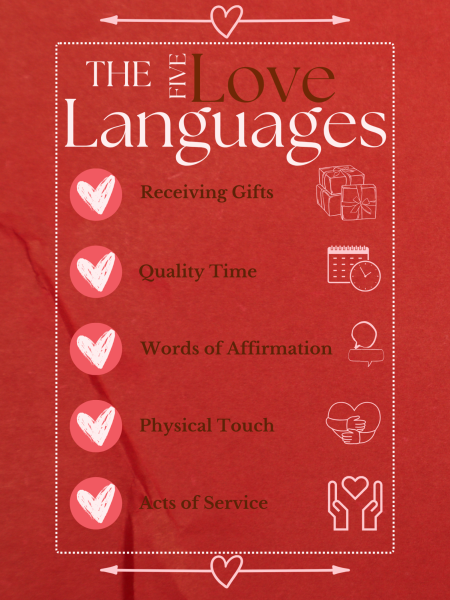To give or not to give, that is the question! As cliche as it sounds, there is nothing more rewarding than a smile when giving someone something to show appreciation and love.
Gift-giving is one of the five love languages, which originated about 30 years ago by Baptist pastor Gary Chapman. Chapman’s ideas are published in the various books he’s written about his theory, some of the most popular ones being: “The Five Love Languages: How to Express Heartfelt Messages to Your Mate,” in 1992 and “The Five Love Languages: The Secret to Love that Lasts,” also in 1992.

Julian Givi is an assistant professor at West Virginia University’s John Chambers College of Business and Economics. Givi’s research finds that givers (the people who give the gift) tend to give gifts based on their desires and motivations. They’re more focused on the reaction of the person rather than the practicality of a gift. They have trouble seeing things from other people’s perspectives, and in this case, it would be the receiver’s. They don’t see that something they find useful may not be the same as another.
The New York Times sent out a survey asking people to identify the best and worst gifts they had received. According to their findings, “When it comes to gift-giving, context is everything. While marketers, influencers, and innumerable holiday gift guides might suggest otherwise, whether a present is a home run or an epic fail depends less on cost, design, style, presentation, or practicality and more on the giver’s ability to listen, observe, and empathize — and perhaps do a little sleuthing.”
Therefore, it’s important to reflect on gifts further and take note of a person’s interests and hobbies. If a person is severely unathletic, it wouldn’t mean much if they were to receive a football as a gift.
Gift-giving not only makes the receiver happy, it also makes the giver happy as well. Michael Norton, professor at Harvard Business School, conducted a study in which they gathered 632 Americans and questioned them about their income, and spending, and then asked them to rate their happiness. The results concluded that “regardless of income level, those people who spent money on others reported greater happiness, while those who spent more on themselves did not.”
On the contrary, in an article by Time magazine, author Rabbi David Wolpe believes that givers tend to be in control when giving. When they give a gift to someone, the receiver may feel indebted to them: feeling that they must give something in return to satisfy them. Wolpe believes that oftentimes, gifts are given with many unspoken conditions, “Often they are conditional gifts, with memory strings attached—’ Remember when I gave you that wonderful present? Surely you would not oppose me now?”
Like many arguments, this may be true in some cases, but not all. Giving is a beautiful thing. It should be to show one’s love and appreciation towards another. Most people give out of the kindness of their heart, not to gain something in their favor. That shouldn’t be the case at all.
Sometimes givers don’t want to feel needy or vulnerable when accepting gifts, therefore they feel like they must be the ones to give instead of receive. They might feel embarrassed or ashamed when accepting a gift. Although this is perfectly normal, it shouldn’t be. Givers don’t need to be ashamed when receiving a gift. What’s so wrong with receiving one every once in a while?
Giving is a form of love, and it’s a beautiful thing, along with receiving. It shouldn’t be seen as something to be embarrassed about. People give, not because they have to, but because they want to, and that’s all there should be to it: no strings attached and no unspoken conditions.


























![The Phoenix varsity volleyball team lines up for the national anthem. “We were more communicative [with each other] during this game, and I feel like we kept our energy up, especially after the first set,” senior Jessica Valdov said.](https://theblazerrhs.com/wp-content/uploads/2024/10/DSC_0202-1200x800.jpg)









![Junior Alex Alkhal pitches the ball. “[I] just let it go and keep practicing so we can focus on our goal for the next game to get better as a team,” Alkhal said.](https://theblazerrhs.com/wp-content/uploads/2025/05/DSC_0013-1-1200x929.jpg)




















